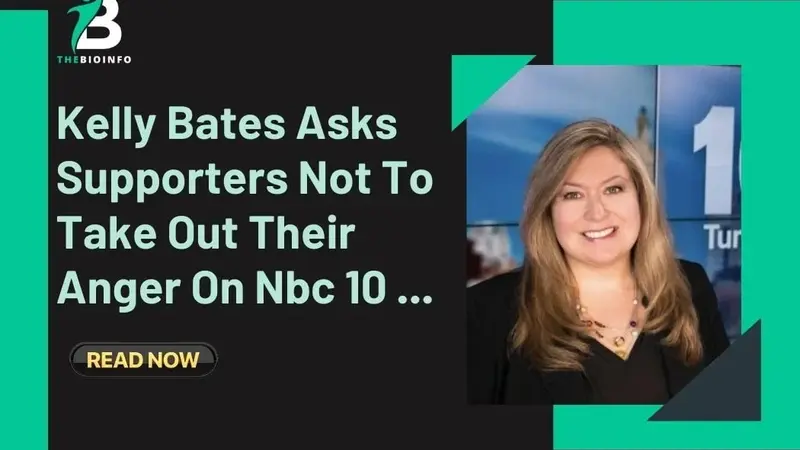Kelly Bates asks supporters not to take out their anger on NBC 10 …a trusted news anchor at NBC 10, has recently made a heartfelt plea to her supporters. In light of growing frustration regarding network decisions, she asked her audience to refrain from directing their anger at the network. Here’s a breakdown of her message, the circumstances surrounding it, and the complexities of journalism in today’s media landscape.
The Background of Kelly Bates’ Career
A Trusted Face in Local Journalism
Kelly Bates asks supporters not to take out their anger on NBC 10 …has been a central figure in local news for many years, known for her reliability, professionalism, and calm demeanor. Her role at NBC 10 has solidified her as one of the most trusted news anchors in Rhode Island and Massachusetts.
Building a Loyal Following
Over time, Bates developed a loyal following of viewers who rely on her for accurate and insightful reporting. Her trusted presence in the community has made her a staple in many households.
The Controversy Surrounding NBC 10
Viewer Frustration
Recently, NBC 10 has faced backlash over programming and editorial decisions. Viewers have been upset about changes in staffing, programming, and content decisions. While Bates, as an anchor, plays a visible role, she has little control over these decisions.
The Fallout
As frustrations grew, viewers began directing their anger at Bates, despite her being uninvolved in the editorial choices. This prompted Bates to take action and publicly ask her supporters for understanding.
Kelly Bates’ Plea to Supporters
| Point | Details |
|---|---|
| A Message of Understanding | Bates recognized the frustration of her audience but clarified that the decisions causing dissatisfaction were beyond her control. |
| Advocating for Compassion | She asked her supporters to be compassionate and understand that journalists are part of a larger system. The anger should not be misdirected at individuals who have no influence over the broader decisions. |
The Complex Relationship Between Journalists and Their Audiences
Public Figures and Accountability
Journalists are often the public face of media organizations, yet they do not have the final say in editorial choices. This creates a disconnect when viewers hold journalists accountable for decisions that are out of their hands.
The Power of Social Media
Social media allows viewers to interact directly with journalists, often holding them responsible for decisions made by corporate entities. Bates’ situation highlights how personal and professional boundaries can become blurred in the age of social media.
The Challenges Journalists Face in the Modern Media Landscape
| Challenge | Details |
|---|---|
| Navigating Public Scrutiny | Journalists face constant public scrutiny, with many decisions being questioned despite the journalist’s limited role in making them. |
| Blurring of Boundaries | Social media has led to a blurring of the line between personal and professional lives. Journalists, like Bates, are often expected to be both public figures and unbiased news deliverers, which can lead to criticism. |
Bates’ Message: Focusing on the Bigger Picture
Encouraging Constructive Engagement
Bates emphasized that the anger should not be directed toward individual journalists. Instead, viewers should focus on larger systemic issues within the media industry, advocating for change at higher levels.
A Call for Patience and Perspective
Her message asked for perspective, reminding viewers that journalists like her work within a complex structure and cannot influence all decisions made by their networks.
Viewer Reactions and the Impact on Journalists
The Burden of Public Expectations
Journalists are often seen as the face of their networks, which means that when things go wrong, they are blamed. Bates’ call for understanding is a reminder that journalists should not be held personally accountable for decisions made by others in the network.
A Reminder of the Human Element
Bates’ plea highlights that journalists are real people working under significant pressure. When viewers direct their anger toward journalists, it ignores the human element and the collaborative nature of news production.
Moving Forward: A Call for Support and Mutual Respect
Maintaining Respect for Journalists
Bates’ request for support is not just about herself but a call for respect toward all journalists. Acknowledging that they are part of larger systems helps foster mutual respect between journalists and their audiences.
Looking for Solutions
Rather than venting anger, Bates encourages her followers to engage in constructive dialogue about how to improve the media landscape. She urges viewers to advocate for reform in the industry, focusing on solutions rather than blame.
Conclusion:
Kelly Bates asks supporters not to take out their anger on NBC 10 …appeal for understanding serves as a reminder of the challenges journalists face. As public figures, they are often unfairly blamed for decisions made by corporate entities. Bates’ call for empathy highlights the need for constructive engagement, mutual respect, and perspective in the complex relationship between journalists and their audience. Visit World Fame Magazine for more details.
FAQs
1. Why did Kelly Bates ask her supporters not to direct their anger at NBC 10?
Bates clarified that recent frustrations with NBC 10’s programming decisions were beyond her control. She asked supporters to avoid blaming her and focus on the broader issues affecting the network.
2. What was Kelly Bates’ main message?
Bates urged her audience to understand that journalists have limited control over editorial decisions. She encouraged them to focus on advocating for change within the media industry rather than misdirecting anger at individuals.
3. What frustrations were viewers expressing?
Viewers were upset about staffing changes, programming shifts, and editorial decisions at NBC 10, feeling disconnected from the network’s direction.
4. How has social media affected the relationship between journalists and viewers?
Social media allows viewers to directly engage with journalists, but it can lead to frustration being misdirected at individuals, as seen in Bates’ case, even when they have no control over decisions.
5. Why should viewers focus on larger media issues?
Bates encouraged viewers to address systemic problems in the media, like advocating for reforms, rather than blaming journalists who may not be responsible for the decisions causing frustration.
6. How can viewers engage constructively?
Bates suggested that viewers engage in discussions about media ethics and reforms, helping to shape a positive future for journalism.
7. What impact did Bates’ message have?
Bates’ message prompted many supporters to reflect on the challenges journalists face, leading to a more empathetic approach to engaging with media organizations.
8. How does Bates’ situation reflect broader media issues?
Bates’ experience highlights how journalists are often unfairly blamed for decisions made at higher levels, emphasizing the need for a more nuanced understanding of the media industry.


